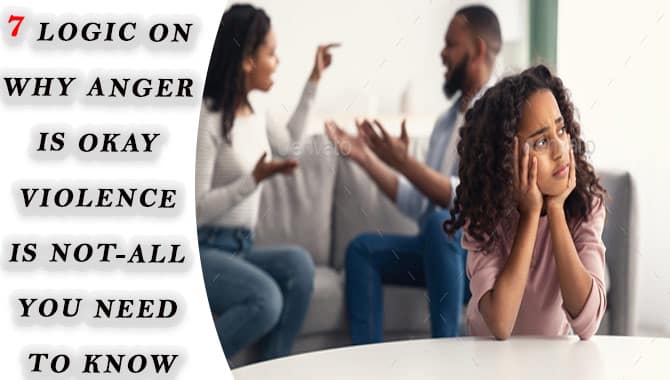There are a lot of people who think that anger is a bad thing. They might tell you that it’s always wrong to get angry or that violence is always the answer. Anger is an emotion that can be both motivating and destructive.
It can spur us on to do great things or push us to lash out in harmful ways. But anger is also a normal part of human interaction, and it’s important to understand how to deal with it healthily.
Here we’ll be exploring seven reasons why anger is okay, and violence is not. We’ll explain how anger can be a helpful emotion, why it can lead to positive outcomes, and why it’s often necessary for social situations, whether you’re looking to overcome anger management issues or want to know more about this often-misunderstood emotion.

Explaining 7 Logic On Why Anger Is Okay, Violence Is Not.

`:
1.Anger Is A Natural Emotion.

Anger is a natural emotion that everybody experiences from time to time. It’s one of the most fundamental human emotions. Expressing anger healthily can help us deal with difficult situations more effectively and achieve our goals. On the other hand, if anger gets out of control, it can lead to violence or destructive behavior. Therefore, understanding how to deal with anger constructively is important for your well-being and those around you. And as we all know – motivation often comes from within.
2.Violence Should Only Be Used As A Last Resort, And Always With Caution.
It is important to understand that anger is a natural response to frustration and should not be suppressed. However, violence always has consequences, both physical and emotional. It can lead to feelings of hatred and revenge and increased tension in the home or workplace. Anger can use as a tool for change- instead of destruction. Using wisely and with caution can help us get what we want without resorting to violence or hurting others unnecessarily.
3.Anger Can Be Used Constructively – As Long As It’s Controlled.

Using anger is a natural emotion that should be constructed – as long as it’s controlled. Managing anger well can help us focus and stay motivated in difficult situations. This can lead to creative thinking, increased productivity, and better decision-making skills. However, You should never act on anger impulsively or without proper consideration this always leads to negative outcomes such as violence and damaged relationships.
Rather than struggling with intense emotions constantly, it would be much wiser (and healthier) to express them constructively. For example, write down your thoughts about the situation for later reflection or share them with trusted friends/family members for feedback and support.
4.When Anger Is Expressed Correctly, It Can Motivate People To Take Action.

Anger is a natural emotion that everyone experiences from time to time. You can use anger in the right way to motivate people and motivate them to take action. Expressing anger correctly can help you focus on what is important and ignore irrelevant distractions. This enables you to break through negative thinking and stay positive in difficult situations. As a result, anger becomes a powerful tool for motivating yourself or others toward desired outcomes.
5.Protect Yourself From Violence By Understanding Its Root Cause

Violence is a problem that affects both the individual and society as a whole. It manifests in different ways but often stems from anger – a natural response to stress or frustration. When anger turns into violence, it can have deadly consequences for the victim and those around them. Understanding the root cause of anger can help us prevent violence from happening in the first place – by helping us recognize when our emotions are getting out of control.
6.When We’re Angry, Our Heart Rate Increases, And Blood Flow Becomes More Intense.

Anger is a natural emotion that helps us cope with challenges. It’s important to remember that anger is often a response to perceived threats or injustices – something small, like getting cut off in traffic, or something larger, like discrimination. Anger can lead to personal growth and development when expressed in healthy ways. For instance, when we’re angry and express it constructively (rather than violently), we learn how to plan and deal with the problem more effectively.
This might involve talking to someone about the issue or writing down our thoughts, so we don’t lash out again later on. Fighting or getting aggressive when angry isn’t always the answer – it only creates more problems for ourselves and those around us. Studies have shown that people who act this way are 3 times as likely to suffer from relationship breakdowns. So next time you’re angry- try calmly expressing yourself instead of lashing out blindly.
7.Violent Anger Clouds Judgment And Makes Decisions That Are Not In Our Best Interest

When angry, making decisions that aren’t in our best interest is easy. Our emotions can override our reasoning and lead us to do things we usually wouldn’t do – this is often when violence takes place. Cloud 0ur judgment is often by anger, which means we won’t be able to think rationally about a better course of action.
This makes it difficult to make sound choices; instead, violence seems a natural solution. In addition, there are often long-term consequences associated with violent anger – such as job loss or relationship problems. So if you get angry frequently and feel out of control, it’s important to seek help from someone who understands your feelings and can guide you through the steps necessary to overcome them.
Violence Is Not The Answer – Learn How To Manage Your Anger Instead.

Having anger is natural, but knowing how to manage it healthily is important. Often, anger gets out of control and leads to violence or other harmful actions. When anger is correctly directed, it can help us solve problems. For instance, if we’re angry at our car for breaking down on the freeway and we take action by getting information about a mechanic nearby or driving our car into traffic instead of sitting there grumbling, that would be an example of using anger in the right way.
Unfortunately, this can be challenging to do. So, learning to restrain ourselves when we’re angry can be one of the most valuable skills you’ll ever learn. You should never use anger to hurt or bully someone else – that’s why understanding its proper use is so important. Hopefully, this article has given you some helpful tips on managing your anger safely and effectively.
5 Tips On How To Avoiding Violence

Anger is a natural response to certain situations, but it’s important to know when it’s okay to express it. When anger is a healthy expression, it can help us resolve conflicts peacefully. Anger is a natural response to frustration and can be helpful in some situations. However, When anger is not controlling, it can lead to violence. Remember that violence isn’t the solution to problems – it only creates more chaos and pain. So, how do we deal with 5 Tips on how to avoid violence:
1.Don’t Take Things Personally.
Anger is a normal reaction to stress and frustration. However, it’s important not to take things personally. Doing so will only lead to violence and unwanted feelings of hurt or anger. When anger inevitably surfaces, address its underlying reasons first – this will help you better understand the situation before making any rash decisions that might worsen matters further. And most importantly- don’t beat yourself up over it.
2.Keep Your Emotions In Check.
Anger is an emotion that we all experience from time to time. Like other emotions, anger must be understood and managed correctly to avoid violence. When anger gets out of control, it can lead to destructive behavior, such as violence or verbal abuse. It’s important not to take things personally – other people may have their own reasons for behaving the way they do. Instead of getting angry, think about what could have led them into this emotional state and try reasoning with them calmly. Fighting fire with fire won’t solve anything.
3.Seek Nonviolent Solutions To Conflicts
Although anger is often a natural reaction to conflicts, it is important to understand that violence, on the whole, never solves anything. It only leads to further disputes and problems in your life and relationship. Nonviolent solutions are often the best action when things get tense. Mediation or arbitration can be very effective ways of resolving conflicts without resorting to violence. Remember that you don’t need to be at each other’s throats to resolve disagreements – discussions and dialogue can work just as well! In the long run, this will help build better relationships overall.
4.Recognize That Anger Can Be Motivational.
Anger is a natural response to feelings of frustration. However, it’s important not to let anger override your judgment and take things wrong. This might lead to violence or other destructive behavior, creating more chaos and tension. When anger does occur, understand that it can often be a motivating force – use this power wisely, for example, by using anger as a tool for achieving goals or objectives rather than letting it control you.
5.Recognize The Signs Of Anger
Anger is a normal reaction to a situation, but it can often lead to violence if not managed correctly. When it comes to violence, there are a few important things that you need to be aware of. The first is that anger can lead to violent behavior, especially when it’s unchecked. Recognizing the signs of anger can help you appropriately deal with the emotion. There are many signs that someone is angry, and it’s important to be aware of them to avoid violence. Here are four such signs:
- An increase in irritability and hostility
- Excessive yelling and screaming
- Interrupting conversations or disregarding others’ feelings
- Becoming agitated easily and getting physical reactions (fist-fighting, etc.).
Conclusion
Anger is a natural emotion that can be helpful in some situations. These days, we are often faced with cases where people have lost their lives over anger. There is a huge difference between being upset and getting violent. We need to be more sensitive and alert when dealing with others’ emotions, especially in social scenarios. Let us all strive for emotional intelligence so that no one ever has to face such horrific situations again. There we explore the 7 logic on why anger is okay and violence is not. We hope this helps you to understand anger in a better light and to make more informed decisions when it comes to violence.
Frequently Asked Questions:
1.What Is The Difference Between Anger And Rage?
Ans: When it comes to anger, there is a big difference between anger and rage. Anger is a natural emotion that is expression healthily when managed properly. When anger expression healthily, it can help us to deal with a range of situations and emotions effectively. On the other hand, rage is an intense and uncontrolled expression of anger, often involving violence or aggression. This can harm both the individual and those around them, resulting in physical violence or destruction.
2.Why Is It Important To Understand Our Emotions?
Ans: Understanding our emotions is important because it can help us identify the source of our anger and manage it healthily. It can also help us express ourselves in more productive ways. Knowing our emotional triggers can help us avoid situations that may lead to outbursts.
3.How Can We Use Our Emotions Constructively?
Ans: When using our emotions constructively, one of the most important things is acknowledging and accepting them without judgment. This means that you don’t put yourself down when you’re feeling a negative emotion and don’t dwell on your feelings excessively. Like anything else, it’s best to start by observing and experiencing your emotions. You can do this by simply sitting down and taking a brief moment to feel everything that’s going on inside of you. Be honest with yourself and allow yourself to fully experience your emotions’ physical sensations.
4.What Are Some Of The Negative Consequences Of Not Managing Our Emotions Well?
Ans: By not managing our emotions well, we can experience many negative consequences. Here are a few of the most common:
- Uncontrolled and violent outbursts can lead to physical harm to both yourself and those around you.
- Not managing our emotions well can lead to decreased self-esteem, guilt or shame, and difficulty forming relationships.
- Poorly managed emotions can also result in reckless behavior such as substance abuse or risky sexual activities.
5.Can Anger Ever Be Justified In Any Situation?
Ans: Yes, anger can often be justified in certain situations. The most important thing to remember is that You should always express anger in healthy and constructive ways. When anger is expressed healthily, it can lead to positive outcomes such as better communication, improved relationships, and a sense of control.

Leave a Reply